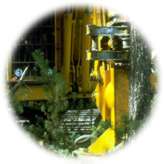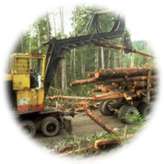|
|
SUSTAINABLE FORESTRY
By Chris Maser, forest ecologist 
We are not now headed toward sustainable forestry, because we are training plantation managers, not foresters. A forester manages a forest. We are liquidating our forests and replacing them with short-rotation plantations. Everything Nature has done in designing forests adds to diversity, complexity, and stability through time. We decrease diversity, complexity, and stability by redesigning forests into plantations.
We must learn to reinvest part of Nature's capital, such as large merchantable logs and large snags, in the maintenance of forest health, so that our mills will have, in perpetuity, a sustainable harvest of timber from fertile, healthy, stable soils, clean water, clean air, and clear sunlight. To reinvest means to give up some of the short-term profits to ensure the long-term sustainability of the forest for future generations. Fertilization and planting trees are not reinvestments. They are investments in the next commercial stand; they are investments in a product, not a reinvestment in maintaining the health of a process. We do not reinvest, because we do not see the forest - only the product, the tree. We do not reinvest, because we ignore the cornerstones of forestry - soil, water, air, sunlight, and biodiversity. If we continue to ignore the fact that the cornerstones of forestry are variables whose health must be accounted for in our economic endeavours, we will surely destroy the forests of the world for future generations.
|
"We need to maintain ancient forests because they are the only living laboratories we have through which we and the future may be able to learn how to create sustainable forests - something no one in the world has so far accomplished."
|
|
We need to maintain ancient forests because they are the only living laboratories we have through which we and the future may be able to learn how to create sustainable forests - something no one in the world has so far accomplished. As a living laboratory, ancient forests serve four vital functions.
First, they are our link to the past, to the historical forest. The historical view tells us what the present is built on, and the past combined with the present, in turn, tells us what the future may be  projected on. To lose the ancient forests is to cast ourselves adrift in a sea of almost total uncertainty with respect to the potential sustainability of future forests. We must remember that knowledge is only in past tense; learning is only in present tense; and prediction is only in future tense. To have sustainable forests, we need to be able to know, to learn, and to predict. Without ancient forests, we eliminate learning, limit our knowledge, and greatly diminish our ability to predict. projected on. To lose the ancient forests is to cast ourselves adrift in a sea of almost total uncertainty with respect to the potential sustainability of future forests. We must remember that knowledge is only in past tense; learning is only in present tense; and prediction is only in future tense. To have sustainable forests, we need to be able to know, to learn, and to predict. Without ancient forests, we eliminate learning, limit our knowledge, and greatly diminish our ability to predict.
Second, we did not design the forest, so we do not have a blueprint, parts catalog, or maintenance manual with which to understand and repair it. Nor do we have a service department in which the necessary repairs can be made. Therefore, how can we afford to liquidate the ancient forest that acts as a blueprint, parts catalog, maintenance manual, and service station - our only hope of understanding the potential sustainability of a redesigned, plantation-forest complex?
|
"Second, we did not design the forest, so we do not have a blueprint, parts catalog, or maintenance manual with which to understand and repair it."
|
|
Third, we are playing "genetic roulette" with the forests of the future through genetic selection for mass wood fiber production in plantation management. What if our genetic simplifications run amok, as they so often have around the world? Maintenance of ancient forests is thus imperative, because they contain the entire genetic code and a full complement of vital processes for living, healthy, adaptable forests. We can help them by maintaining as much biological diversity as possible, which in turn will make our forests as resilient as possible. Resiliency, which equates to adaptability, will allow the plant and animal communities the greatest opportunity to adapt to new and changing environmental conditions.
 Fourth, we must maintain intact segments of the ancient forest from which we can learn to make the necessary adjustments, in both our thinking and our subsequent course of management, to help assure the sustainability of the future's plantation-forest complex. If we choose not to deal with the heart of the ancient forest issue - sustainable forests - we will find that reality is more subtle than our understanding of it, and unknowingly, our "good intentions" will likely give bad results. Fourth, we must maintain intact segments of the ancient forest from which we can learn to make the necessary adjustments, in both our thinking and our subsequent course of management, to help assure the sustainability of the future's plantation-forest complex. If we choose not to deal with the heart of the ancient forest issue - sustainable forests - we will find that reality is more subtle than our understanding of it, and unknowingly, our "good intentions" will likely give bad results.
Although there are many valid reasons to save ancient forests, there is only one reason that I know of for liquidating them - short-term economics. Economics, however, is the common language, the common objective that drives Western civilisation; is it not wise, therefore, to carefully consider whether saving substantial amounts of well-distributed ancient forests is a necessary part of the equation for maintaining a solvent forest industry?
|
"Third, we are playing "genetic roulette" with the forests of the future through genetic selection for mass wood fiber production in plantation management."
|
|
I have often heard that "we can't afford to save ancient forests, they are too valuable and too many jobs are at stake." I submit, however, that we must be exceedingly cautious that economic judgement does not isolate us from the evidence that without sustainable forests we won't have a sustainable forest industry. Therefore, if we liquidate the ancient forests - our living laboratories - and our plantations fail, as plantations are failing over much of the world, industry will be the bathwater thrown out with the baby.
As we liquidate the ancient forests of the world, for whatever "rational" reason, we are, as a global society, simultaneously destroying our historical roots and grossly impairing our spiritual well-being. What we are doing to the forests is but a mirror reflection of the mentality with which we treat ourselves and one another. All we have in this world as human beings is one another - here, now, this moment. And when everything is said and done in our frantic drive for short-term economic gains, if we have lost sight of one another, we will find that we have nothing of value after all.
|
"Therefore, if we liquidate the ancient forests - our living laboratories - and our plantations fail, as plantations are failing over much of the world, industry will be the bathwater thrown out with the baby."
|
Return to Conservation Articles
|
|

